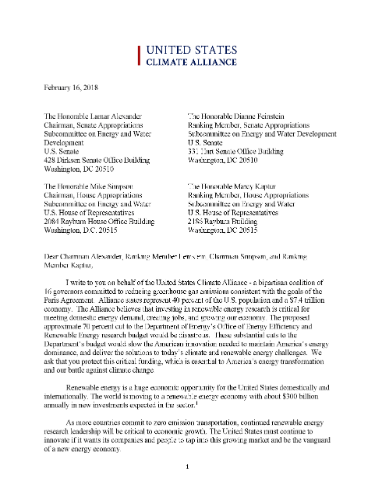Home / U.S. Climate Alliance Asks Congress to Protect Critical Funding for Renewable Energy and Energy Efficiency Research and Development
- Letter
U.S. Climate Alliance Asks Congress to Protect Critical Funding for Renewable Energy and Energy Efficiency Research and Development
February 16, 2018
American innovation in clean energy is essential to delivering solutions to today’s climate and energy challenges, and maintaining America’s energy dominance.
The United States Climate Alliance has sent a letter to leaders in the Senate and House Appropriations Committees requesting that Congress protect critical funding for renewable energy and energy efficiency research and development. Supporting energy innovation is essential to America’s energy transformation and our battle against climate change.
The Alliance believes that investing in renewable energy research is essential to meeting domestic energy demand, creating jobs, and growing our economy. The proposed approximate 70 percent cut to the Department of Energy’s energy efficiency and renewable energy research budget would be disastrous. These substantial cuts to the Department’s budget would slow the American innovation needed to maintain America’s energy dominance, and deliver the solutions to today’s climate and renewable energy challenges.
About the Alliance
Launched in 2017 by the governors of Washington, New York, and California to help fill the void left by the U.S. federal government’s withdrawal from the Paris Agreement, the Alliance has grown to include 24 governors from across the U.S. representing approximately 60 percent of the U.S. economy and 55 percent of the U.S. population. Governors in the Alliance have pledged to collectively reduce net greenhouse gas emissions by at least 26-28 percent by 2025, 50-52 percent by 2030, and 61-66 percent by 2035, all below 2005 levels, and collectively achieve overall net-zero greenhouse gas emissions as soon as practicable, and no later than 2050.
The Alliance’s states and territories continue to advance innovative and impactful climate solutions to grow the economy, create jobs, and protect public health, and have a long record of action and results. In fact, the latest data shows that as of 2023, the Alliance has reduced its collective net greenhouse gas emissions by 24 percent below 2005 levels, while increasing collective GDP by 34 percent, and is on track to meet its near-term climate goal of reducing collective greenhouse gas emissions 26 percent below 2005 levels by 2025.
###
